FOR IMMEDIATE RELEASE
CONTACT: John McDaid 401 662-3198
Feb 16, 2021
COX OUTAGE TAKES PORTSMOUTH OFFLINE
PORTSMOUTH, RI — For more than two weeks, scores of Portsmouth residents have suffered internet service interruptions due to an outage at Cox Communications. In conversations with customers, Cox has acknowledged the outage, but has offered no explanation and "no estimated time when service will be restored."
"People can't work from home, shop safely, or keep in touch with loved ones," said John McDaid, who uses Zoom to teach his college classes. "This is the middle of a pandemic, with new, more-contagious viral strains circulating, and Cox is making it more difficult for me and my neighbors to stay safe."
"This is a major utility outage," said McDaid, "And should be treated with the same sense of urgency as the 2019 gas outage in Newport."
The problems began, residents say, around two weeks ago, when they began to see extremely slow internet speeds and intermittent time-outs and failures. Several have been performing speed tests on their connections, and although they have contracted for 50-200 megabits of download, some are seeing 1-2 megabits, with some upload speeds under 200 kilobits. According to Zoom's support page, the minimum speed required for a multi-person conference is 1 megabit up.
Portsmouth residents like Holly Delanoy of Common Fence Point and Keith Brown of Island Park have been complaining on the Facebook group "All Things Portsmouth" and on the Nextdoor site devoted to Common Fence Point in the northern part of town. Multiple residents have reported the inability to work or teach from home. Erin w. from Newport said, "I can’t get anything beyond “our technicians are working on it, sorry for the inconvenience” - no idea when I’ll be able to do my job properly again. About to head into a 1.5hour meeting using my mobile data."
Updated to add following paragraph
Jess Worby, from Island Park, said, "I am a teacher working from home in Island Park, paying for the 150 Mb basic plan. With this plan, you can generally expect–and this is straight from a Cox rep–50 to 100 Mb/s in download speed. For the last couple weeks, it has been hanging between 0 and 20, usually on the lower end. My students say I drop out every third word on Zoom, so it is impacting their education. Calls my wife and I make in the house drop unless we turn off Wifi on our phones. I have talked to a cox rep 4+ times about connection issues, upgraded our modem, moved the router, had the ground wires checked, etc., and still we are having these issues."
Barbara Gee, from the Bristol Ferry Road area, said, "We lose the internet at least once a day - we unplug, re-plug, unplug... you know the routine. We even got a new router from them because I was so unhappy. We pay for the "fastest" internet but it is consistently "unstable."
Susan Tunak, who lives in the Common Fence Point said, "I work at home and everything has been extra slow every day. I also use a headset through my computer and I’m often told that I keep cutting in and out, so not only is work production affected, so is communication. It is very difficult to work under these conditions."
Multiple residents have reported the issue both to Cox and the RI Public Utilities Commission. Cox representatives have also resisted calls to adjust all customers bills, saying that people must call one-on-one.
"If this were any other utility," said McDaid, "There would be news coverage and political pressure to resolve the issue and deliver the services for which Cox has a local monopoly."
As of Tuesday, 2/16, Cox customers are still being told, "Our technicians continue to work to resolve the problem in your neighborhood. Currently, there is no estimated time for when service will be restored"
- 30 -
Attachments:
1 Speed test performed 8:06 am on 2/16, using an iMac directly connected via ethernet. Reported speed: 1.18Mbit down, .05Mbit up.
2 Speed te4st performed 10:45am on 2/16 using iPad over wifi. Reported speed 5.6Mbit down, 0.3Mbit up.
UPDATE 2/18 #1
Complaint filed on 2/18 with RI Attorney General consumer protection division and the FCC
First level reps simply rebooted devices to no effect. Second level, Northeast Executive Resolution CSR "Mary" said on 2/16 that she could see no issue, and refused a request to issue a blanket reimbursement. Her explanation was that because everyone has a different plan, they were unable to issue any kind of general reimbursement. Her manager, Carol Lisi, said on 2/16 that the issue was most likely equipment in houses, and wanted to send a technician to check. I explained that this started suddenly, two weeks ago, and therefore this didn't make sense. She also reiterated Mary's position on a general refund.
A review of posts from around the country on the online discussion board Reddit reveals that this is a common pattern, where Cox makes changes in their networks (which sometimes break the existing devices they have provisioned customers with), puts consumers through slowdowns and outages, blames their home setup, sends technicians out to do cosmetic changes that fail to do anything, and only acts when pushed by local PUCs or the FCC. This is a problem in need of a systemic solution on behalf of Rhode Island consumers.
More info at:
Reddit
and
Ars Technica
UPDATE 2/18 #2
Here in Island Park, Cox internet went out totally for five minutes at around 11pm last night, and when it came back up, we are now seeing 80-90Mbits down/10Mbits up in speed tests. On Nextdoor, one user reports being contacted by a rep from the Northeast Executive Resolution group who said that an issue had been fixed early this morning. This would clearly point to a change in their network -- despite several Cox reps telling people it was the equipment in their houses.
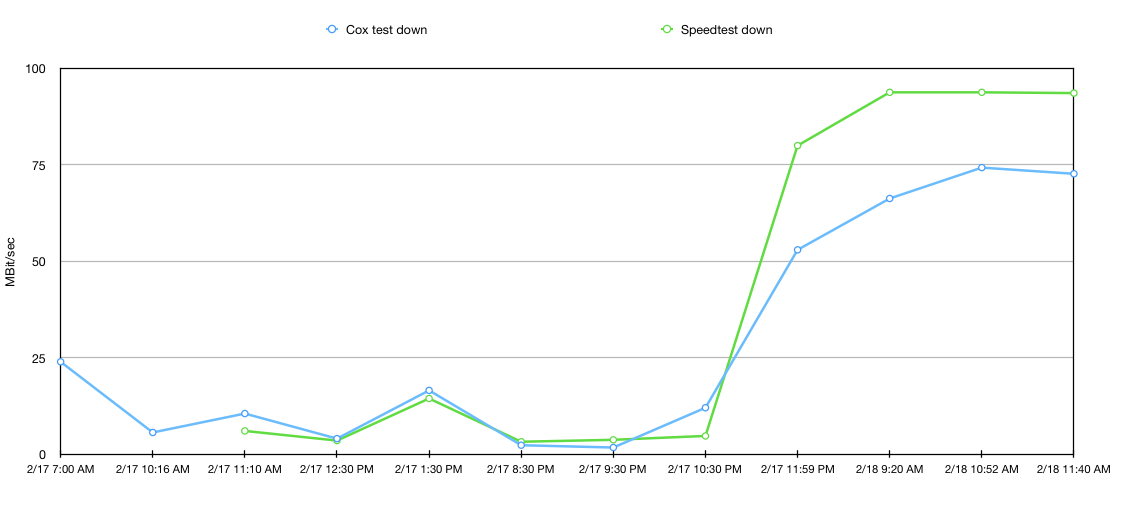
UPDATE 2/18 #3
Update #3 4:52pm
Yesterday, Carol Lisi from Northeast Executive Resolution gave me her mobile phone number to call her any time. I left a message this morning to ask about the discrepancy between the messaging yesterday. Her direct report Mary said that she didn't see anything wrong, and implied that it was my "old" modem, which hadn't been replaced for years. Ms. Lisis insistence that a "home health check" was necessary to look into what might be wrong with the wiring or set up inside the house. The fact that a change to the network after 10pm last night suddenly fixed the issue proves that it was not related to anything in our house. I was also going to ask her about issuing blanket refunds. Mary explained that it was impossible because -- and she took a *lot* longer to say this -- everyone has a different level of service at different prices. I was going to ask how difficult it is to divide everyone's bill's by two, since we've had these issues for half of February. But she never called me back. I did raise these issues in an email exchange with the RI AGs office. Not sure if they rise to an offense under RI General Law §6-13.1-2, but we'll see.
UPDATE 2/19
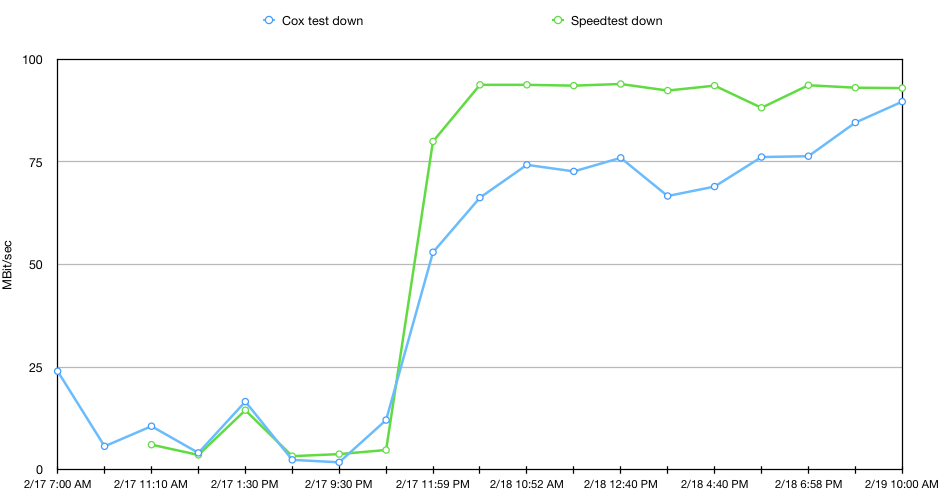
With Cox internet solidly up for over 24 hours (and even their automated text notification system reporting "Your outage has been resolved,") we can all hopefully relax a little and focus on the bigger picture. That's what I've tried to do in this letter to the editors of our local papers, sent this morning.
To the editors:
At around 10 p.m. on Wednesday 2/17, Rhode Island Cox engineers reset internet access for customers across Newport county. They fixed something. Scores of residents who, for almost three weeks, had been suffering with unacceptably slow service -- 10 megabits downstream and less than 600 kilobits up -- suddenly had full 90/10 mbit speed restored.
Normally, this would be a cause for celebration.
But the question is why Cox customer service -- all the way up to Northeast Executive Resolution -- continued gaslighting customers when they knew a there was a network issue. Multiple customers were told that the problem was with aging modems and internal wiring. Cox refused to acknowledge an issue on their side and urged that technicians be dispatched for "home health checks" in the middle of a pandemic.
It was only after multiple residents had filed complaints with the RI Public Utilities Commission, the RI Attorney General, and the FCC, that Cox suddenly discovered a way to fix their system. Then they refused to issue blanket refunds to everyone affected, requiring instead that people call in one-by-one. This is no way to run a railroad.
Being threatened by both fiber and satellite, the impulse for existing cable internet providers is to retrench and wring every last marginal dollar from the customer, seeking lock-in through bundling phone, tv, and home automation at the expense of focused service delivery.
A bill just introduced in the RI House, H5148, would create a broadband council tasked with developing a strategic plan for providing reliable, 21st-century internet access. This incident with Cox provides ample evidence for the measure's necessity, and I urge folks to contact our legislators and urge their support.
John McDaid
Portsmouth
Text of H5148 available here.
UPDATE 3/1
For completists, here's the final pdf testimony package delivered to the committee:
McDaid written testimony on H5148 delivered to the Innovation, Internet, & Technology Committee, 2/23/21
UPDATE 4/21
After the speed issues reappeared two weeks ago, I filed a second complaint with the FCC and sent this letter to the RI Attorney General and the Cox CEO. This is not just a technical matter; the consistent behavior of Cox first and second-line service reps in blaming problems on customer wiring suggests a pattern of behavior. On the evening of April 10, when we were getting speeds which made us essentially unable to use the internet, the rep from Northeast Executive Resolution literally said, "Asking us to fix the problem is like asking a mechanic to fix your car when it's in your garage." He insisted that nothing could be done without a service call. A day later, our internet was back to normal, and this morning, Mary from NER acknowledged the issue was "ongoing planned maintenance" and was unable to explain why their previous rep did not know that. See speedtests, showing problem resolution with no entry to customer premises.
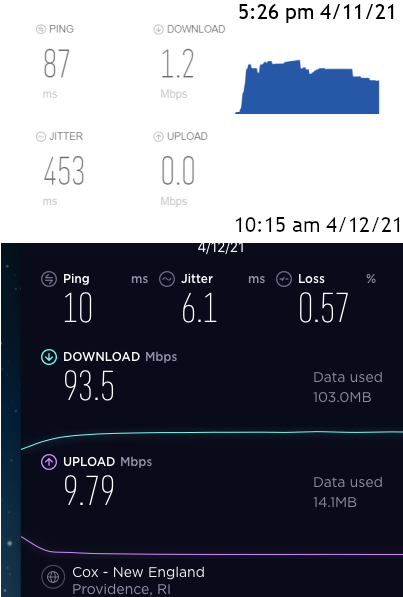
 By Sen. Dawn Euer
By Sen. Dawn Euer
 By Sen. Alana DiMario and Rep. Terri Cortvriend
By Sen. Alana DiMario and Rep. Terri Cortvriend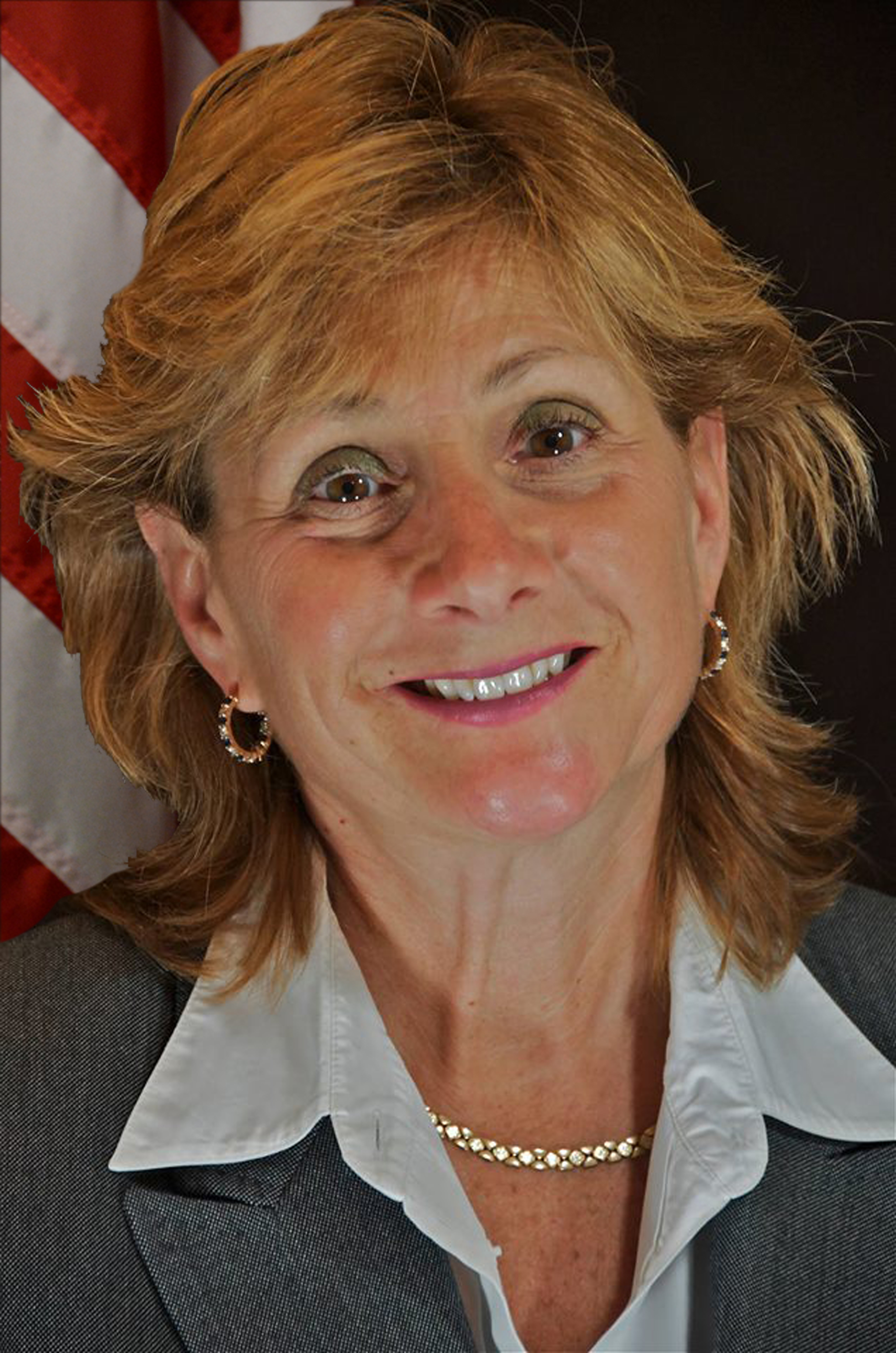 By Rep. Deborah Ruggiero
By Rep. Deborah Ruggiero
 Totally chuffed that the piece I wrote two weeks ago won the song contest at the Northeast Filk Convention.
Totally chuffed that the piece I wrote two weeks ago won the song contest at the Northeast Filk Convention.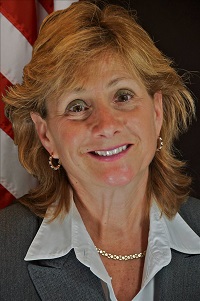 COVID-19 has been the most convincing argument for Rhode Island to invest in high-speed internet, or dedicated broadband. Whether for remote working from home, distance learning or telehealth, broadband access must be reliable, fast and affordable. You wouldn’t buy a house or relocate your business without access to water or electricity. High-speed internet in a 21st economy is a necessary utility (although Rhode Island state law preempts any regulation of internet or telecoms- a story for later).
COVID-19 has been the most convincing argument for Rhode Island to invest in high-speed internet, or dedicated broadband. Whether for remote working from home, distance learning or telehealth, broadband access must be reliable, fast and affordable. You wouldn’t buy a house or relocate your business without access to water or electricity. High-speed internet in a 21st economy is a necessary utility (although Rhode Island state law preempts any regulation of internet or telecoms- a story for later).

